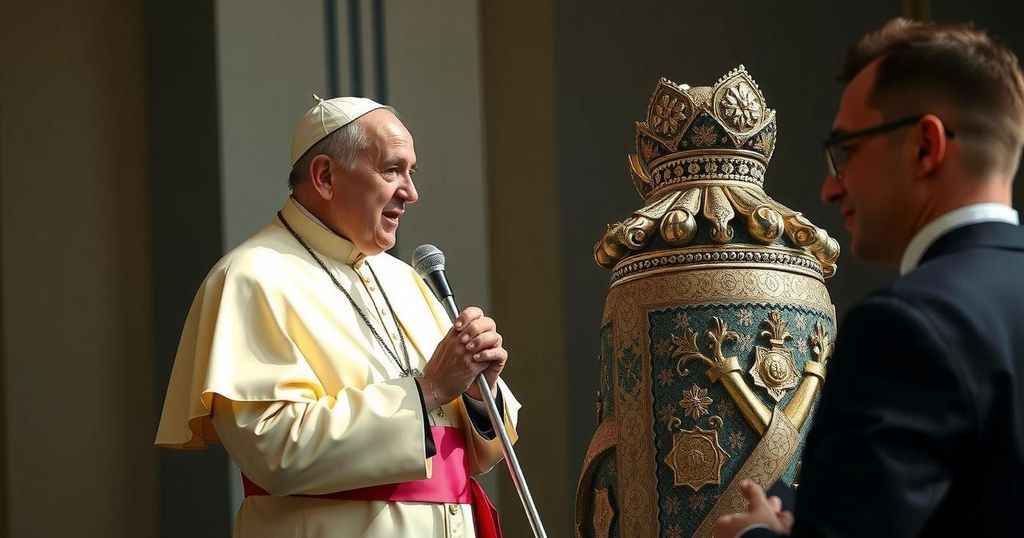Pope Francis’ vision for interreligious dialogue is being embraced in Kazakhstan, as various leaders gather to promote peace and understanding among different faiths. The recent meeting at the Palace of Peace and Reconciliation reinforces Kazakhstan’s commitment to fostering interreligious dialogue amidst its diverse population. Despite challenges related to religious freedoms, the country remains dedicated to cooperation, reflected through international engagements and initiatives aimed at addressing global challenges through dialogue.
Pope Francis’ call for interreligious dialogue, emphasizing global solidarity, peace, and fraternity, has resonated particularly in Kazakhstan, a predominantly Muslim nation. During a recent interreligious gathering in Astana, leaders from diverse faiths convened to demonstrate their commitment to peaceful discourse, underscoring Kazakhstan’s role as a hub for such dialogue. The event, held at the Palace of Peace and Reconciliation, highlighted the country’s rich tapestry of religions and ethnicities and its strategic position in promoting stability in a region beset by conflicts.
Kazakhstan has a long-standing tradition of fostering interreligious cooperation, inspired by past efforts from the Catholic Church, notably Pope St. John Paul II’s engagement in the country. The ongoing interreligious congress, now in its 22nd session, is an initiative that reflects this commitment, leading to notable ecclesiastical meetings and dialogues focused on shared goals of peace and understanding among different faiths. The leaders’ collaborative declaration against extremism, confirmed by Pope Francis and religious authorities, further emphasizes this mission.
Kazakhstan’s ambassador to the Holy See, Kairat Sarzhanov, noted the synergy between the nation’s values and those of the Catholic Church, which are grounded in goodness and compassion. This partnership is critical, considering Kazakhstan’s geopolitical dynamics, bordering nations like China and Russia, and its historical context of adopting a peaceful foreign policy, even dismantling a significant nuclear arsenal post-independence.
Despite a legal framework that places constraints on religious activities in the name of security, Kazakhstan’s interfaith dialogue continues to thrive. The Apostolic Nuncio underscored the importance of such dialogues as opportunities for leaders to deepen their faith and understanding. Ongoing strategies include appointing goodwill ambassadors to cultivate spiritual diplomacy, reflecting a commitment to addressing global challenges through collaboration. Ultimately, this commitment to peace between different faiths highlights the potential of interreligious dialogue as a conduit for stability and mutual respect in an increasingly polarized world.
Interreligious dialogue has been a cornerstone of Pope Francis’ papacy, with efforts to build bridges among various religions being a recurrent theme. Kazakhstan, with its rich ethnic and religious diversity, serves as an ideal ground for these initiatives to take root, fostering understanding in a region often challenged by conflicts. The country has established itself as a neutral and cooperative partner in global peace efforts, bolstered by its strategies on nuclear disarmament and its commitment to engaging with multiple faiths in a dialogue that seeks to quell extremism and foster peaceful coexistence. Kazakhstan’s efforts are evident through the continued organization of interfaith meetings and collaborative declarations aimed at promoting mutual respect and harmony among religions, guided by principles rooted in the teachings of the Catholic Church.
Pope Francis’ call for interreligious dialogue has found a receptive audience in Kazakhstan, where leaders across various faiths are uniting to promote peace amidst a multicultural backdrop. Through ongoing dialogues and strategic initiatives, Kazakhstan exemplifies a commitment to cultivating understanding and cooperation among religions, showcasing the potential of spiritual diplomacy to address global issues. As the nation moves forward, its role as a facilitator of interfaith engagement will be crucial in the pursuit of a peaceful, inclusive future for all faiths.
Original Source: www.ncregister.com






